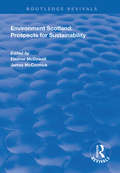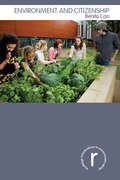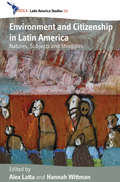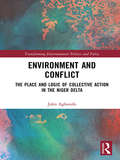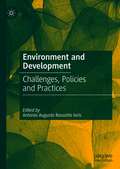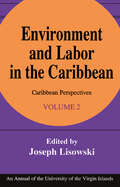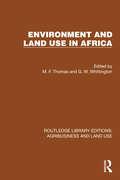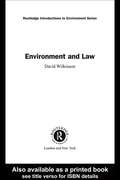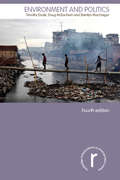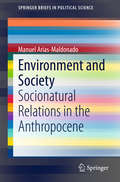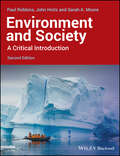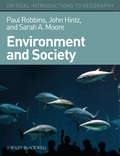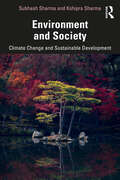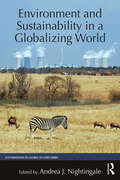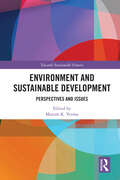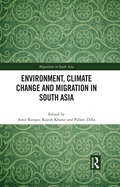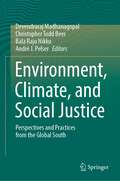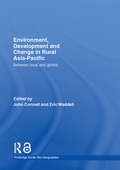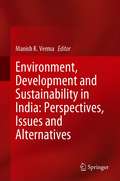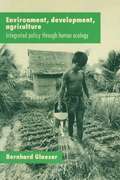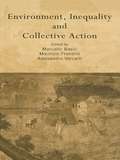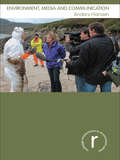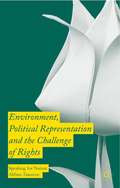- Table View
- List View
Environment (Eighth Edition)
by Linda R. Berg Peter H. Raven David M. HassenzahlThe 8th Edition of "Environment" builds on the previous comprehensive, systems-based environmental science issue with more in-depth information on systems approach, which emphasizes the interconnected nature of environmental science throughout the text. The book is even more reader-friendly integrated learning system designed to help move from general concepts to specific applications and continues to focus on currency. It presents the basic facts, various perspectives on issues, and framework to help readers reach their own informed decisions in a changing marketplace.
Environment Scotland: Prospects for Sustainability (Routledge Revivals)
by Eleanor McDowell James McCormickPublished in 1999, this volume provides the first thorough analysis of the elements of sustainable public policy in a devolved Scotland. Following the vote for a Scottish Parliament in the 1997 referendum, it explores the immediate and longer-term challenges likely to confront Scotland. The book brings together policy-thinkers and practitioners from academia, business, the voluntary sector and politics to ask: What are the key opportunities and constraints around sustainability? What practical difference will devolution make? What changes within and beyond government will be required to strengthen the roots of sustainable development? It includes the findings from a specially-commissioned opinion poll published in this volume for the first time. Offering a far-sighted analysis, the book poses a series of timely questions and offers policy recommendations for the next decade.
Environment and Citizenship (Routledge Introductions to Environment: Environment and Society Texts)
by Benito CaoThe increasing awareness of the human impact on the environment is having a profound effect on the concept and content of citizenship – one of the fundamental institutions that structures human relations. In what is the first introduction of its kind, this book provides an accessible, stimulating and multidimensional overview of the many ways in which concern for the environment – driven primarily by the preoccupation with sustainability – is reshaping our understanding of citizenship. Environment and Citizenship is structured into three parts. Part I introduces the reader to the concept and theories of citizenship and explores the impact that environmental concerns is having on contemporary formulations of citizenship, both traditional (e.g. national, liberal and republican) and emerging (e.g. cosmopolitan, ecological and ecofeminist). Part II explores the practical manifestations of environmental citizenship, with each chapter focusing on a particular actor: citizens, governments, and corporations. These chapters include references to examples and case studies from a wide range of countries, broadly categorized as belonging to the Global North and the Global South. Part III explores the making of green citizens and outlines the dominant articulations of environmental citizenship that emerge from formal education, news media and popular culture. The book concludes with a general reflection on the present and future of environmental citizenship. The book contains a variety of illustrations, boxed case-studies, links to online resources and suggestions for further reading. This original and engaging text is essential reading for students and scholars of environmental politics, sustainability studies and development studies, as well as for environmental activists, policy practitioners and environmental educators. More broadly, this book will appeal to anyone interested in and concerned with issues of sustainability, social justice and citizenship in the twenty-first century.
Environment and Citizenship in Latin America
by Alex Latta Hannah WittmanScholarship related to environmental questions in Latin America has only recently begun to coalesce around citizenship as both an empirical site of inquiry and an analytical frame of reference. This has led to a series of new insights and perspectives, but few efforts have been made to bring these various approaches into a sustained conversation across different social, temporal and geographic contexts. This volume is the result of a collaborative endeavour to advance debates on environmental citizenship, while simultaneously and systematically addressing broader theoretical and methodological questions related to the particularities of studying environment and citizenship in Latin America. Providing a window onto leading scholarship in the field, the book also sets an ambitious agenda to spark further research.
Environment and Conflict: The Place and Logic of Collective Action in the Niger Delta (Transforming Environmental Politics and Policy)
by John AgbonifoEnvironmental degradation is a fast-growing problem that not only threatens to erode future development and undermine economic prosperity, but also victimizes and displaces ordinary peoples and communities in some of the most fragile areas of the world. Often grassroots opposition and mobilization is seen through a secular lens, implying that collective action is merely material and provincial. In this book John Agbonifo argues for a decolonization of the environment and to see the environment from the perspective of local communities. He examines the case of the Ogoni struggle against the Shell oil company, and asks how may we understand the struggle of the Ogoni against the state and Shell? Was the conflict merely about a minority ethnic drive at securing provincial advantages in distributional matters, or the legitimate actions of a local community aimed at preserving its environment and livelihood? Exploring the material and symbolic, provincial and nationalist dimensions of Ogoni motivation, Agbonifo's book is the first serious attempt to discuss these issues. The book will appeal to scholars and students of the Niger Delta conflicts, resource-related conflicts and social movements, in Africa and elsewhere. Those researching in the fields of development studies, political geography, civil society and collective action will also find it useful.
Environment and Development: Challenges, Policies and Practices
by Antonio Augusto Rossotto IorisThis book provides a comprehensive overview of emerging challenges facing different social groups, policy-makers and the international community related to economic growth, social development and environmental change, social inclusion and regional development. The book undertakes a critical assessment of the tensions associated with the failures of mainstream regulatory approaches and impacts of social and economic policies whilst widening the discussion on the interface between the expansion of the socio-environmental demands, equity and justice. These are crucial challenges, of great importance today and of equal relevance to the Global North and South. The book explores one of the main contradictions of development, the simplification of assessments and narrow consideration of alternatives. Taking this dilemma as its departure point, it goes on to examine the justification, trends and limitations of Western-based development and possible alternatives to fundamentally modify the basis and the rationale of the development process. It considers theoretical and lived experiences of development, paying attention to multiple scales, local realities and economic frontiers. Contributing authors explore policy recommendations and discuss effective practical tools for determining the values different people hold for ecosystem services and territorial resources. They cover the monitoring of change in the provision of ecosystem services that might increase the well-being of vulnerable groups as well as strategies to promote innovation and integrated, equitable and sustainable development.
Environment and Labor in the Caribbean
by Joseph LisowskiThe Caribbean Perspectives series began as a response to the need for scholarly investigations into social, scientific, and economic conditions affecting the least understood, or written about, part of the Americas. In this second volume the authors have included explorations of aspects of management and climate; as well as social, literary, and educational concerns in the eastern Caribbean, along with an extended study of the labor situation in the U.S. Virgin Islands.The opening chapter on resource management training in the Caribbean underscores the need for cooperation among eastern Caribbean universities and provides a practical model for implementation. This is followed by a significant study of rainfall patterns that could influence economic and cultural planning in the Virgin Islands. School environment is assessed in the next chapter, and educators will see how the quality of social support and interactions function in organizational contexts, especially as they relate to teacher morale.How fact becomes fiction is chronicled in a chapter dealing with Samuel Selvon's autobiographical novel, A Brighter Sun. The media clearly had a se-rious problem separating fact from fiction in their reporting of the aftermath of Hurricane Hugo in St. Croix. The next chapter investigates the causes of looting following that storm and lays to rest some widespread misconceptions.The final chapters focus on the labor movements in the Virgin Islands, both from historical and sociological points of view. These chapters not only help explain certain tendencies in the Caribbean work force but also outline social implications for the future. Some of these findings are bound to be controversial, such as the author's contention that the legacy of slavery is still being felt. This volume of Caribbean Perspectives offers both factual accounts and challenging insights into the diversity of Caribbean life and culture. The ideas and data found here will reverberate and suggest a host of analogous circumstances elsewhere. This volume, and the series as such, will interest students of the Caribbean, Latin America, and social development in the Third World.
Environment and Land Use in Africa (Routledge Library Editions: Agribusiness and Land Use #24)
by M. F. Thomas G. W. WhittingtonOriginally published in 1969, the contributors to this volume examine the natural and social environments of selected areas in Africa and study in detail some particular problems and their solutions. Climate, landforms, soils and vegetation are discussed as fundamental aspects of the physical environment. The next section discusses the social and political environment: demography, agricultural systems and the legacies of colonial administration. Case studies in Malawi, Nigeria, Sudan, Eswatini and Kenya are analysed. The book is aimed at students of African studies, geographers and agriculturalists.
Environment and Law (Routledge Introductions to Environment: Environment and Society Texts)
by David WilkinsonThis textbook provides a concise introduction for students with little or no legal background, to the role of law in environmental protection. It describes and explains law and legal systems, the concept of the environment, sources of environmental law and some of the techniques used in environmental law. Interdisciplinary in approach, the book explores some of the major connections between law and the disciplines of ethics, science, economics and politics.Environment and Law offers a greater understanding of international and national environmental law and has case-studies from all over the world, including examples from UK, US and Australian law.
Environment and Politics (Routledge Introductions to Environment: Environment and Society Texts)
by Timothy Doyle Doug McEachern Sherilyn MacGregorEnvironment and Politics 4th Edition is a concise introduction to this ever-expanding interdisciplinary field, explaining and illustrating how concepts, conflicts, movements, political systems and the practices of policy-making can be analysed in a systematic way. This book provides a comprehensive overview of the key themes that shape the field, and examines a diverse range of environmental problems and policy solutions found in different countries and cultures. The new edition has been extensively revised to include up-to-date explanation of green political theories and traditions and the debates that shape action on the ground. It contains an expanded discussion of environmental movements that work in the Global North, the Global South and transnationally. Greater attention has been given to the roles of corporations, non-governmental organizations, the media, consumers and citizens in order to reflect the changing nature of environmental governance. The text also focuses throughout on debates surrounding the concepts of environmental security, environmental justice and environmental citizenship. The authors examine the institutional responses of parliaments, administrative, legal and electoral systems; the more informal politics of social movements; and the politics of markets and the corporate sector as they respond to (or resist) the greening of societies. This engaging text has been fully updated to offer readers a greater understanding of international, national and local environmental politics as well as expected future developments at all levels. Environment and Politics continues to use illustrative examples of conflicts, people and events spanning North and South America, Europe, Asia, Africa and Australia, giving it global perspective and relevance. Each chapter includes questions for debate as well as a list of key words and resources for independent research. This successful textbook remains a key resource for undergraduate and postgraduate studies across politics, environmental studies, development studies and human geography courses.
Environment and Society
by Manuel Arias-MaldonadoThis short book sets out to explore the concept of nature in the context of a changing reality, in which the extent of our transformation of the environment has become evident: What is nature and to what extent has humanity transformed it? How do nature and society relate to one another? What does the idea of a sustainable society entail and how can nature be understood as a political subject? What is the Anthropocene and how does it affect nature as both an idea and a material entity? Has nature perhaps "ended?" In addressing these questions, the author delivers a concise but meaningful study of contemporary understandings of nature, one that goes beyond the limits posed by a single discipline. Adopting a truly comprehensive perspective, the work incorporates classical disciplines such as philosophy, evolutionary theory and the history of ideas; new and mixed approaches ranging from environmental sociology to neurobiology and ecological economics and the emerging area of the environmental humanities and represents a growing branch of political thought that views nature as a new political subject.
Environment and Society: A Critical Introduction
by Paul Robbins John Hintz Sarah A. MooreSubstantially updated for the second edition, this engaging and innovative introduction to the environment and society uses key theoretical approaches to explore familiar objects. Features substantial revisions and updates for the second edition, including new chapters on E waste, mosquitoes and uranium, improved maps and graphics, new exercises, shorter theory chapters, and refocused sections on environmental solutions Discusses topics such as population and scarcity, commodities, environmental ethics, risks and hazards, and political economy and applies them to objects like bottled water, tuna, and trees Accessible for students, and accompanied by in-book and online resources including exercises and boxed discussions, an online test bank, notes, suggested reading, and website links for enhanced understanding Offers additional online support for instructors, including suggested teaching models, PowerPoint slides for each chapter with full-color graphics, and supplementary images and teaching material
Environment and Society: A Critical Introduction (Critical Introductions to Geography #13)
by Paul Robbins John Hintz Sarah A. MooreEnvironment and Society: A Critical Introduction is an overview of the diverse conceptual tools and traditions for thinking about, explaining and addressing the environmental challenges we face in the contemporary world. Provides an introduction to the environmental challenges we face in the contemporary world through foundational theoretical ideas illustrated with concrete, everyday examples Utilizes compelling, conversational language to expound on theory, history, and scientific topics, making the text accessible to a diverse readership Draws upon contemporary theoretical understandings in nature/society theory while demonstrating through practice and deployment Includes discussion of key historical events, topical issues, and policies, as well as scientific concepts
Environment and Society: A Reader
by Colin Jerolmack Anne Rademacher Christopher Schlottmann Dale Jamieson Maria DamonEnvironment and Society connects the core themes of environmental studies to the urgent issues and debates of the twenty-first century. In an era marked by climate change, rapid urbanization, and resource scarcity, environmental studies has emerged as a crucial arena of study. Assembling canonical and contemporary texts, this volume presents a systematic survey of concepts and issues central to the environment in society, such as: social mobilization on behalf of environmental objectives; the relationships between human population, economic growth and stresses on the planet’s natural resources; debates about the relative effects of collective and individual action; and unequal distribution of the social costs of environmental degradation. Organized around key themes, with each section featuring questions for debate and suggestions for further reading, the book introduces students to the history of environmental studies, and demonstrates how the field’s interdisciplinary approach uniquely engages the essential issues of the present.
Environment and Society: Climate Change and Sustainable Development
by Subhash Sharma Kshipra SharmaThis book presents a comprehensive, lucid, and accessible approach to environmental sociology. It traces the origins of environmental sociology and examines the realist–constructionist debate in ecology for a holistic exploration of the field. The volume: • Presents a step-by-step systematic approach to the study of environmental sociology • Includes case studies from Asia, Africa, Europe, and the Americas and introduces theoretical perspectives from Asia, Africa, and South America to provide a more comprehensive view of the field • Has separate chapters on sustainable development and climate change • Discusses ecological movements in India and highlights environmental issues of the Global South A key text for undergraduates, postgraduates, and civil services aspirants, this book goes beyond western scholarship to include indigenous approaches to the field. It will be indispensable for students of sociology, climate change, environmental studies, and sustainable development.
Environment and Sustainability in a Globalizing World (Foundations in Global Studies)
by Andrea J. NightingaleFrom the Foundations in Global Studies series, this student-friendly text follows a two-pronged approach to help readers understand the globalizing processes relating to environment and sustainability, which are examined in a range of disciplines, including environmental studies, geography, global studies, political science, international affairs, comparative politics, and other disciplines. First, it presents foundational material that gives students the conceptual underpinnings required for rigorous analysis. Following the Introduction and Overview, Part One presents a brief historical overview of the concerns revolving around environmental sustainability in the modern era. The text then covers key concepts and theoretical constructs that define the global context for sustainable environmental practices, such as the key thinkers and theories pertaining to sustainable environmental practice, and the key international agencies and treaties involved in global discussions. The first part then explores the various models and ways to measure sustainability, the range of environmental domains at play in the sustainability dialogue, and the controversies surrounding them. Part Two employs case studies to examine theory and practice at work in particular situations. The case studies have been selected with an eye toward comprehensiveness of coverage across disciplines and across regions.
Environment and Sustainable Development: Perspectives and Issues (Towards Sustainable Futures)
by Manish K. VermaThis volume provides a comprehensive account of the linkages between environment and sustainable development in society from an interdisciplinary perspective. With its case studies from across the world, including countries such as India, Australia, South Africa, Sri Lanka, the United States, Croatia, Italy, Brazil, Japan, and Kenya, it explores critical environmental issues concerning energy justice, queer ecology, mountain cultures, incarceration, energy strategies, mining tourism, pollution control mechanisms, social impacts of oil and gas production, contract farming, gender mainstreaming, climate change, and droughts and adaptation strategies along with literacy, leisure, well-being, development, sexuality, sustainability and environmental education. The book examines several dimensions within global environment of the adverse impact of developmental activities, discusses sustainable development activities undertaken in contemporary times, and underscores the importance of a just, people-centric policy framework in promoting sustainable development. Lucid and topical, this book will be useful to scholars and researchers of environmental studies, development studies, sustainable development, political studies, sociology, and political economy. It will also interest policymakers, development practitioners, NGOs and think tanks working on environment and sustainable development, climate issues and SDGs.
Environment, Climate Change and Migration in South Asia (Migrations in South Asia)
by Amit Ranjan Rajesh Kharat Pallavi DekaThis book presents a comprehensive analysis of the linkages between climate change and migration in South Asia. With help of case studies, it discusses wide-ranging themes like environment, migration, and population displacement; climate change induced migration in Afghanistan; new migration crisis in Bangladesh; climate change and refugees in Bhutan; gendered perspective of displacement in India; deforestation, riverbank erosion and migration in India; internally displaced persons (IDPs) of the Maldives; migration, mitigation and legal framework in Myanmar; climate change and human mobility in Nepal; Pakistan’s climate migrants; and vulnerability and resilience of Sri Lankan migrants. Part of Migrations in South Asia series, this topical book will be an essential read for scholars and researchers of migration studies, diaspora studies, refugee studies, climate change and environment studies, sustainable development studies, public policy, and development studies.
Environment, Climate, and Social Justice: Perspectives and Practices from the Global South
by Devendraraj Madhanagopal Christopher Todd Beer Bala Raju Nikku André J. PelserThis book approaches environmental, climate, and social justice comprehensively and interlinked. The contributors, predominantly from the Global South and have lived experiences, challenge the eurocentrism that dominates knowledge production and discourses on environmental and climate [in] justices. The collection of works balances theoretical, empirical, and practical aspects to address environmental and climate justice challenges through the lens of social justice. This book gives voice to scholars of the Global South and uses an interdisciplinary approach to show the complexity of the problem and the opportunities for solutions, making this book a powerful resource in teaching, research, and advocacy efforts. The innovativeness of this approach stems from the use of narratives, scientific explanation, and thematic analysis to present the arguments in each chapter of this edited book. Overall, each chapter of this book acts as a powerful resource in teaching, research, and advocacy efforts. This book fills a gap in the Global South production of environmental, climate, and social justice. It provides in-depth knowledge to the readers and raises their critical thinking about key elements/discussions of justice issues of environmental conflicts and climate change. The book is a useful read to a general audience interested in the topic of climate, environment, and development politics.
Environment, Development and Change in Rural Asia-Pacific: Between Local and Global (Routledge Pacific Rim Geographies #Vol. 6)
by John Connell Eric WaddellThis volume examines the economic, political, social and environmental challenges facing rural communities in the Asia-Pacific region, as global issues intersect with local contexts. Such challenges, from climatic change and volcanic eruption to population growth and violent civil unrest, have stimulated local resilience amongst communities and led to evolving regional institutions and environment management practices, changing social relationships and producing new forms of stratification. Bringing together case studies from across mainland Southeast Asia and the Island Pacific, an expert team of international contributors reveal how communities at the periphery take charge of their lives, champion the virtues of their own local systems of production and consumption, and engage in the complexities of new structures of development that demand a response to the vacillations of global politics, economy and society. Inherent in this is the recognition that 'development' as we have come to know it is far from over. Each chapter emphasizes the growing recognition that ecological and environmental issues are key to any understanding and analysis of structures of sustainable development. Providing diverse multidisciplinary theoretical and empirical perspectives, Environment, Development and Change in Rural Asia-Pacific makes an important contribution to the revitalization of development studies and as such will be essential reading for scholars in the field, as well as those with an interest in Asia-Pacific studies, economic geography and political economy.
Environment, Development and Sustainability in India: Perspectives, Issues and Alternatives
by Manish K. VermaThis book provides a comprehensive account of asymmetric linkage in the trilogy of environment, development and sustainability and its impact on society. It examines varied perspectives and issues of development related to environmental destruction and sustainability challenges. By examining the recent trends of development and recording the dilemmas which are creating ecological imbalances, it explores some alternative ways of development to achieve sustainability. Divided into three parts, it has a broad canvass. The first section examines critically the ‘perspectives’ on ecology, practice and ethics, rural development and man–forest interaction in the metropolis. ‘Issues’ of dams, river, agricultural distress, environmental migration, eco-tourism, ecological conservation and land acquisition are assessed in part second. ‘Alternative’ means of development is explored in part third by incorporating chapters on the constructed wetland, biofuels, subsistence economy, water and traditional knowledge practice. This interdisciplinary book is of immense significance to academicians, researchers, postgraduate and graduate-level students of social sciences and environmental studies; policymakers, development practitioners and NGOs working in the area of environment and development.
Environment, Development, Agriculture: Integrated Policy through Human Ecology (Routledge Revivals Ser.)
by Bernhard GlaeserSummarising the democratic experience in modern Western civilisation, this text defines the term and looks at its changing meanings over the past two centuries or so. It records criticisms, and is especially concerned with the conditions that are necessary for democracy to exist.
Environment, Inequality and Collective Action (Routledge Siena Studies in Political Economy)
by Maurizio Franzini Alessandro Vercelli Marcello BasiliEfficiency is the hallmark of environmental economics, and though economists are concerned with the environment, primarily because it challenges the efficiency of competitive markets, until now, limited attention has been paid to distributional issues. This excellent collection of essays identifies and addresses key issues surrounding the inequality-environment relationship such as: * Does increasing economic inequality lead to better or worse environmental quality? * Which individual or social features play a role in determining the differentiated impact of changes in the environment? * What impact does economic inequality or social segmentation have on collective action?* How important is the complex economic and social institution in which the inequality-environment takes place? With an impressive array of contributors and an excellent mix of popular and noteworthy topics, this latest addition to the Routledge Siena Studies in Political Economy series will prove essential to economists with an interest in the environment and will be useful to readers with a more general environmental studies background.
Environment, Media and Communication
by Anders HansenCommunication about ‘the environment’ in and through a broad array of news, advertising, art and entertainment media is one of the major sources of public and political understanding of definitions, issues and problems associated with the environment. Environment, Media and Communication examines the social, cultural and political roles of the media as a public arena for images, representations, definitions and controversy regarding the environment. The book starts by discussing and outlining a framework for analyzing media and communication roles in the emergence of the environment and environmental problems as issues for public and political concern. It proceeds to examine who and what drives the public agenda on environmental issues, addressing questions about how governments, scientists, experts, pressure groups and other stakeholders have sought to use traditional as well as newer media for promoting their definitions of the key issues. The media are not merely an open public arena or stage, but rather themselves a key gate-keeper and influence in the process of communicating about the environment: the role of news values, organizational arrangements and professional practices, are thus examined next. Recognizing the importance of wider popular culture narratives to public understanding and communication about the environment and nature, the book proceeds with a discussion of the messages and moral tales communicated about the environment, science and nature in a range of media, including film and advertising media. It shows how this wider context provides important clues to understanding the successes and failures of selected environmental issues or campaigns. The book finishes with an examination of the key approaches and models used for understanding how the media influence and interact with public opinion and political decision-making on environmental issues. Offering a comprehensive introduction to theoretical approaches and models for the study of media and communication roles regarding the environment, and drawing on empirical research evidence and examples from Europe, America, Australia and Asia, the book will be of interest to students in media/communication studies, geography, environmental studies, political science and sociology as wll as to environmental professionals and activists.
Environment, Political Representation and the Challenge of Rights: Speaking For Nature
by Mihnea TanasescuTanasescu examines the rights of nature in terms of its constituent parts. Besides offering a thorough theoretical grounding, the book gives a first detailed overview of the actual cases of rights for nature so far. This is the first comprehensive treatment of the rights of nature to date, both analytically and in terms of actual cases.

